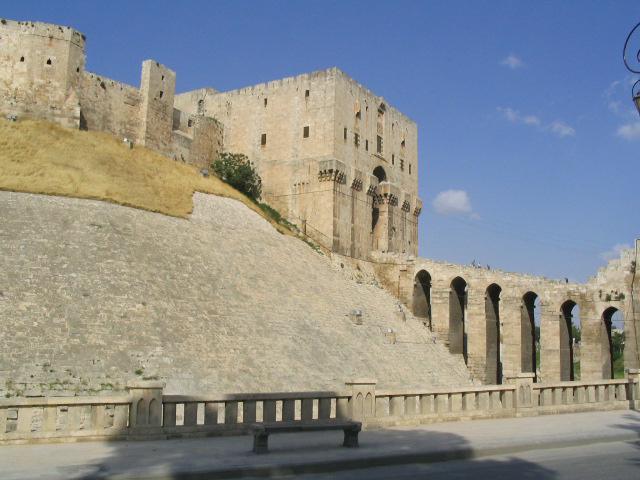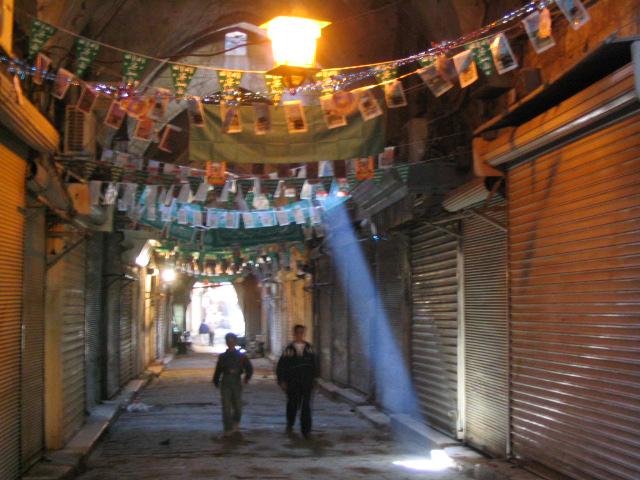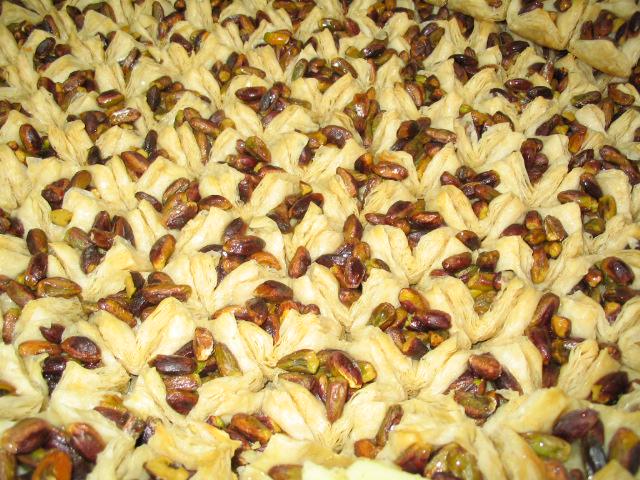Aleppo (حلب, Ḥalab) is the largest city in Syria - population 2.1 million. Its old city is listed as a UNESCO World Heritage site.
 As it is in any Muslim country, the call to prayer is called out from mosques five times a day starting in the early morning. It can be a beautiful sound.
As it is in any Muslim country, the call to prayer is called out from mosques five times a day starting in the early morning. It can be a beautiful sound.
Aleppo is a fairly conservative city. Dress appropriately to avoid any problems and to avoid standing out too much. Men should wear shirts and trousers and women should not wear anything that is too revealing. If you follow that simple dress code you should not have any problems. Head scarves are not necessary unless you want to enter a mosque but even then grey robes are available at no extra charge.
There are no hostile feelings towards Americans or Westerners in general (although Americans tend to be subjected to more scrutiny by the authorities than other nationalities). You could, however, find yourself in trouble if you engage in open criticism of and against the Syrian government or the president. Your best bet is to avoid political conversations all together just to avoid any possible problems. If you do engage in political discussions with Syrians, be aware that they might face intense questioning by the secret police if you are overheard. As a general rule, always assume that you are being watched by the plain-clothes policemen (mukhabarat). You will notice that not many uniformed policemen can be seen in the streets, but this is because the police have a wide network of plain-clothes officers and informants.
Friday is a holy day and most shops and historic sites are closed so plan accordingly for this.
Stealing is looked down upon and thus is not very common. Crime is generally low and you should feel safe to walk around in any part of the city at any time day or night. But as in any city, it's a good idea to keep an eye on your belongings, particularly in the souk.
Meals are a bit later than in the U.S. but similar to the times in some European countries. Lunch is from 13:00 to 15:00 and dinner around 20:00. Syrians take a siesta in the middle of the day, from about 15:00 to 18:00, but this means that the night life is very active. You can return to the markets and public squares that you visited during the day and by 22:00 they will be bustling with people selling food and treats and drinks. It is a like a street fair every night.
Aleppo is a beautiful and historic city, but is too dangerous to recommend visiting.
- Citadel of Aleppo. On a hill in the centre of the city and is visible from almost anywhere. Usage of the Citadel hill dates back at least to the middle of the 3rd millennium BC, but the current structure dates from the 13th century. The citadel survived the fighting relatively intact and there are daily tours as of 2017.
- Al-Madina Souq. With a total lenght of almost 13 kilometers, this used to be the largest souk in the world and had all of the shopping you could want to do from gold and silver, boxes, clothing, fabric and soap. Severely damaged during the civil war. A small part of the souk called al-Saqatiyah reopened in 2019. Bargaining is encouraged and if you know some Arabic it will get you a much better price.
- Bimaristan Arghan. A beautiful mental hospital turned into a museum. Entrance is free and you can wander around and look at exhibits, which include old medical equipment, herbs, biographies of famous Arab scientists and other interesting artifacts. The main attractions, however, are the courtyard and two separate spaces reserved for the mentally ill.
- Great Mosque of Aleppo. Also known as the Umayyad Mosque of Aleppo is the largest and one of the oldest mosques in Aleppo, built between the 11th and 14th centuries. Its minaret, dating back to 1090 along with other parts of the mosque was destroyed during the Syrian civil war in April 2013. Both the mosque and its minaret are to be rebuilt during the coming years.
- National Museum of Aleppo. Archaeological museum documenting the history of Syria, it was hit by missiles in 2016 and most artifacts evacuated. After extensive reparation, the museum re-opened in October 2019.
Citadel of Aleppo. On a hill in the centre of the city and is visible from almost anywhere. Usage of the Citadel hill dates back at least to the middle of the 3rd millennium BC, but the current structure dates from the 13th century. The citadel survived the fighting relatively intact and there are daily tours as of 2017.
Al-Madina Souq. With a total lenght of almost 13 kilometers, this used to be the largest souk in the world and had all of the shopping you could want to do from gold and silver, boxes, clothing, fabric and soap. Severely damaged during the civil war. A small part of the souk called al-Saqatiyah reopened in 2019. Bargaining is encouraged and if you know some Arabic it will get you a much better price.
Bimaristan Arghan. A beautiful mental hospital turned into a museum. Entrance is free and you can wander around and look at exhibits, which include old medical equipment, herbs, biographies of famous Arab scientists and other interesting artifacts. The main attractions, however, are the courtyard and two separate spaces reserved for the mentally ill.
Great Mosque of Aleppo. Also known as the Umayyad Mosque of Aleppo is the largest and one of the oldest mosques in Aleppo, built between the 11th and 14th centuries. Its minaret, dating back to 1090 along with other parts of the mosque was destroyed during the Syrian civil war in April 2013. Both the mosque and its minaret are to be rebuilt during the coming years.
National Museum of Aleppo. Archaeological museum documenting the history of Syria, it was hit by missiles in 2016 and most artifacts evacuated. After extensive reparation, the museum re-opened in October 2019.
Walk around the city at least a few times to really get a feel for what it is like. It is a vibrant and lively place that will continually surprise you. Any amount of time spent walking around the city will reveal another historical site or point of interest. Check out the Christian section of the city to see a different part of Aleppo. If you want to shop for clothes, al-Telal street is bustling nearly every night with crowds checking out the shops and street stands piled high with every type of clothing imaginable.

Gold: Although the prices are as high as they have ever been, gold is still a worthwhile purchase here. There is a special gold pattern called the Aleppo weave or chain that is made only in Aleppo. All gold is sold by weight and is 22 carat.
Boxes: Aleppo is also famous for its intricate inlay work that can be found in boxes of all shapes and sizes. These boxes are beautiful and can be found at almost all of the shops in the souq. A great, affordable gift to take home.
Wraps/tablecloths: There are many nice wraps that can be worn as shawls or used as tablecloths that are also available everywhere in the souqs. Another good gift.
Sweets: Pistachios are everywhere in Aleppo and accordingly there are many different kinds of sweets made from the pistachio. These usually come in a decorative box and are yet another good gift.
Coffee and spices: It is impossible to walk through the souq without being caught up in the scent of freshly ground coffee and spices like cumin. You can also buy very ornate pots to make your coffee in.
Soap: One of the most famous Aleppine products is its olive oil soap. Many factories produce this using traditional techniques. The price varies depending on the proportion of olive and laurel oil, prices and assortment is better in the shops just in the 2 roads south of the Clock Tower rather than in the Souq's tourist traps, even if most shop keepers speak very little English (prices per kilo are clearly shown).

Common Syrian street food like falafels and shwarma are excellent and available throughout the city. In the souks you will also find tiny restaurants with a few stools serving up dishes like Fuul (pronounced “fool”), a bean soup served with fresh bread, onions and mint. If you are adventurous, look for the men frying curry-flavoured pancakes near the entrance to the souk. The pancakes are wrapped in bread and topped with hot sauce. Also try and buy some of the freshly made pita bread that is sold everywhere as it is delicious.
For breakfast, a fresh glass of juice and cheese sandwich can be had from the juice stands near the clock tower. Many cafés also serve great ice cream for a treat.
If you are tired after a day of wandering around the souk, try one of the cafés near the base of the citadel. They offer light snacks and drinks, including a wide range of coffees and refreshing glasses of minted lemonade.
Travellers on a strict budget should be prepared to eat very similar meals everyday as there is not a lot of variety in the diet at the cheaper end of the range.
There are plenty of good restaurants around and meals are very affordable.
- La Gondole, +963 21 4124095. Cafe and restaurant featuring a Swimming pool with a sitting table around the pool and outdoors bar under the sunshine.
- Al Mir, +963 21 3336580. Cafe and restaurant featuring a rerrace with views over the Aleppo Citadel.
- Beit Sissy. A particularly good choice. It has a beautiful courtyard and their shish kebab in cherry sauce is out of this world!
- Sheraton Hotel. It may seem wrong to come to Syria and head for the Sheraton but they do offer an excellent buffet breakfast, which, if you're willing to splurge, makes a nice change from the typical Syrian fare and will set you up well for a day of exploring. They also do a fine cup of coffee.
La Gondole, +963 21 4124095. Cafe and restaurant featuring a Swimming pool with a sitting table around the pool and outdoors bar under the sunshine.
Al Mir, +963 21 3336580. Cafe and restaurant featuring a rerrace with views over the Aleppo Citadel.
Beit Sissy. A particularly good choice. It has a beautiful courtyard and their shish kebab in cherry sauce is out of this world!
Sheraton Hotel. It may seem wrong to come to Syria and head for the Sheraton but they do offer an excellent buffet breakfast, which, if you're willing to splurge, makes a nice change from the typical Syrian fare and will set you up well for a day of exploring. They also do a fine cup of coffee.
- Al- Challal
- WANES Restaurant
Al- Challal
Alcohol is permitted but not widely available. You can find stores selling liquor on a few streets near the clocktower. Try Zaki al-Arsuzi (across from Al Kommeh restaurant) and Jbrail Dalal streets. There is a liquor store a few metres away from the Aleppo Hotel (on a side street from the clocktower). In the new city there is a store at Al Hateb square. Restaurants and hotels that cater to Westerners will generally serve alcoholic beverages.
There is one local beer, called Al-Sharq, while the Damascus brew Barada may also be found. Neither are exactly lethal - 3.7% and 3.4% respectively.
A wide range of other beers from the Middle East and Europe can also be found, along with wines from Syria, Lebanon and France.
Arak is a local aniseed spirit which can be found at some small shops.
- Al Attar Cafe. Popular café with magnificent views over the entrance of Aleppo citadel.
Al Attar Cafe. Popular café with magnificent views over the entrance of Aleppo citadel.
An internet access in the old town and near the main attractions (the Citadel, the Souq and the Grand Mosque) can be found at Tara Cafe. It is located in the underground lair of the caravansaray of the Adlliyah Mosque and provides standard rates for internet access. It is not an internet cafe, but rather a cafe that provides internet access as a service on laptops that can be rented by the hour.
The Friends Cafe Net is also located in the area of the Citadel. From the entrance to the Citadel, walk straight (south) to a block with shawarma & chicken outlets on the ground floor. The cafe is just behind the block in a small street called "Jnenyt al-Fariq(1)". From the outlets, follow the street to your right, turn left then immediately right.
The closest internet cafe to most of the budget hotels, in the Bab al-Faraj area, is the Concord, which is in an ice cream parlor and cafe by the same name. It charges an outrageous rate for Aleppo and Syria and general.
The other internet cafe within walking distance is at Adam Cafe, across the street from the Baron Hotel. Nevertheless, the internet cafe is in the bottom story of an all-male tea house which may make female customers feel uncomfortable. If you wander around the new Christian quarter of al-Aziziyeh you can find many internet cafes such as Area 51, Montana and Kool Net which offer high speed access. All of the aforementioned cafes provide discount cards for chunks of time.
Many buildings in the city, particularly in the Salaheddin neighborhood and surrounding areas, have been damaged severely by the civil war. Buildings can and do collapse, often with deadly consequences. Stay away from buildings that have sustained heavy damage or look structurally unstable.
